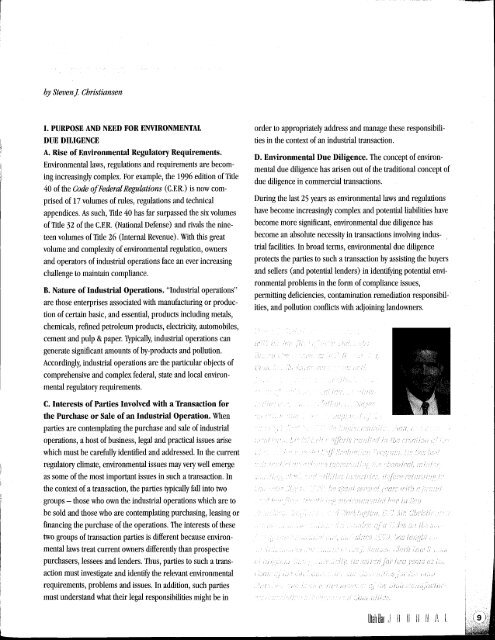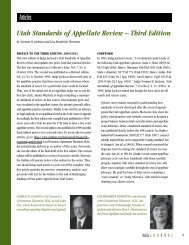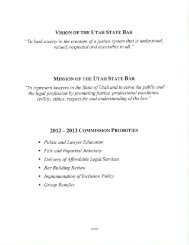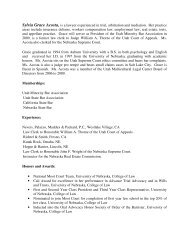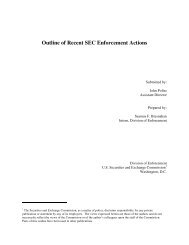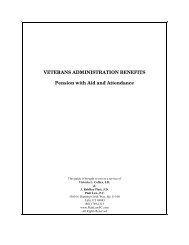March 1999 Volune 12 No3 - Utah State Bar
March 1999 Volune 12 No3 - Utah State Bar
March 1999 Volune 12 No3 - Utah State Bar
You also want an ePaper? Increase the reach of your titles
YUMPU automatically turns print PDFs into web optimized ePapers that Google loves.
by Steven J Christiansen<br />
i. PURPOSE AN NEED FOR ENVIRONMENTAL<br />
DUE DILIGENCE<br />
A. Rise of Environmenta Regulatory Requirements.<br />
Environmental laws, reguations and requirements are becom-<br />
ing increasingly complex. For example, the 1996 edition of Title<br />
40 of the Code of Federal Regulations (C.ER.) is now com-<br />
prised of 17 volumes of rules, regulations and technical<br />
appendices. As such, Title 40 has far surpassed the six volumes<br />
of Tile 32 of the C.ER. (National Defense) and rivals the nie-<br />
teen volumes of Title 26 (Internal Revenue). With this great<br />
volume and complexity of environmental regulation, owners<br />
and operators of industrial operations face an ever increasing<br />
chalenge to maintain compliance.<br />
B. Nature of Industrial Operations. "Industrial operations"<br />
are those enterprises associated with manufacturing or produc-<br />
tion of certain basic, and essential, products including metals,<br />
chemicals, refined petroleum products, electricity, automobiles,<br />
cement and pulp & paper. Tyicaly, industrial operations can<br />
generate signifcant amounts of by-products and pollution.<br />
Accordingly, industrial operations are the particular objects of<br />
comprehensive and complex federal, state and local environ-<br />
mental regulatory requirements.<br />
C. Interests of Paries Involved with a Transaction for<br />
the Purchase or Sale of an Industrial Operation. When<br />
partes are contemplating the purchase and sale of industrial<br />
operations, a host of business, legal and practical issues arise<br />
which must be carefuy identied and addressed. In the current<br />
regulatory climate, environmental issues may very well emerge<br />
as some of the most important issues in such a transaction. In<br />
the context of a transaction, the parties tyicaly fal into two<br />
groups - those who own the industrial operations which are to<br />
be sold and those who are contemplating purchasing, leasing or<br />
financing the purchase of the operations. The interests of these<br />
two groups of transaction parties is dierent because environ-<br />
mental laws treat current owners dierently than prospective<br />
purchasers, lessees and lenders. Thus, parties to such a trans-<br />
action must investigate and identif the relevant environmental<br />
requirements, problems and issues. In addition, such parties<br />
must understand what their legal responsibilties might be in<br />
order to appropriately address and manage these responsibil-<br />
ties in the context of an industrial transaction.<br />
D. Environmenta Due Diligence. The concept of environ-<br />
mental due dilgence has arisen out of the traditional concept of<br />
due digence in commercial transactions.<br />
During the last 25 years as environmental laws and regulations<br />
have become increasingly complex and potential liabilties have<br />
become more signicant, environmenta due dilgence has<br />
become an absolute necessity in transactions involving indus- .<br />
trial facilties. In broad terms, environmenta due dilgence<br />
protects the paries to such a transaction by assisting the buyers<br />
and sellers (and potential lenders) in identifng potential envi-<br />
ronmental problems in the form of compliance issues,<br />
permitting deficiencies, contamnation remediation responsibil-'<br />
ities, and pollution confcts with adjoining landowners.<br />
~lan~arJ!J U H i~ ßì i.


